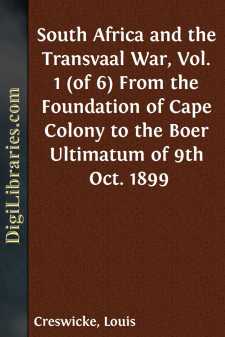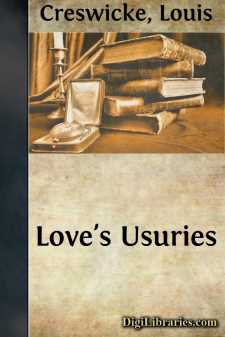Categories
- Antiques & Collectibles 13
- Architecture 36
- Art 48
- Bibles 22
- Biography & Autobiography 813
- Body, Mind & Spirit 138
- Business & Economics 28
- Children's Books 12
- Children's Fiction 9
- Computers 4
- Cooking 94
- Crafts & Hobbies 4
- Drama 346
- Education 46
- Family & Relationships 57
- Fiction 11821
- Games 19
- Gardening 17
- Health & Fitness 34
- History 1377
- House & Home 1
- Humor 147
- Juvenile Fiction 1873
- Juvenile Nonfiction 202
- Language Arts & Disciplines 88
- Law 16
- Literary Collections 686
- Literary Criticism 179
- Mathematics 13
- Medical 41
- Music 40
- Nature 179
- Non-Classifiable 1768
- Performing Arts 7
- Periodicals 1453
- Philosophy 64
- Photography 2
- Poetry 896
- Political Science 203
- Psychology 42
- Reference 154
- Religion 505
- Science 126
- Self-Help 81
- Social Science 81
- Sports & Recreation 34
- Study Aids 3
- Technology & Engineering 59
- Transportation 23
- Travel 463
- True Crime 29
South Africa and the Transvaal War, Vol. 1 (of 6) From the Foundation of Cape Colony to the Boer Ultimatum of 9th Oct. 1899
by: Louis Creswicke
Description:
Excerpt
INTRODUCTION
The Transvaal War—like a gigantic picture—cannot be considered at close quarters. To fully appreciate the situation, and all that it embraces, the critic must stand at a suitable distance. He must gaze not merely with the eye of to-day, or even of the whole nineteenth century, but with his mind educated to the strange conditions of earlier civilisation. For in these conditions will be found the root of the widespread mischief—the answer to many a riddle which superficial observers have been unable to comprehend. The racial hatred between Boer and Briton is not a thing of new growth; it has expanded with the expansion of the Boer settlers themselves. In fact, on the Boer side, it is the only thing independent of British enterprise which has grown and expanded since the Dutch first set foot in the Cape. This took place in 1652. Then, Jan Van Riebeck, of the Dutch East India Company, first established an European settlement, and a few years later the burghers began life as cattle-breeders, agriculturists, and itinerant traders. These original Cape Colonists were descendants of Dutchmen of the lower classes, men of peasant stamp, who were joined in 1689 by a contingent of Huguenot refugees. The Boers, or peasants, of that day were men of fine type, a blend between the gipsy and the evangelist. They were nomadic in their taste, lawless, and impatient of restrictions, bigoted though devout, and inspired in all and through all by an unconquerable love of independence. With manners they had nothing to do, with progress still less. Isolation from the civilised world, and contact with Bushmen, Hottentots, and Kaffirs, kept them from advancing with the times. Their slaves outnumbered themselves, and their treatment of these makes anything but enlivening reading. From all accounts the Boer went about with the Bible in one hand and the sjambok in the other, instructing himself assiduously with the Word, while asserting himself liberally with the deed. Yet he was a first-rate sporting man, a shrewd trafficker, and at times an energetic tiller of the soil. The early settlements were Rondebosch, Stellenbosch, and Drakenstein, in the valley of the Berg River. Here the Dutch community laboured, and smoked, and married, multiplying itself with amazing rapidity, and expanding well beyond the original limits.
Dutch domination at the Cape lasted for 143 years after the landing of Van Riebeck, but gradually internal dissensions among the settlers resulted in absolute revolt. Meanwhile the Dutch in Europe had lost their political prestige, and the country was overrun by a Prussian army commissioned to support the House of Orange. In 1793, in a war against allied England and Holland, France gained the day, and a Republic was set up under French protection, thereby rendering Holland and her colonies of necessity antagonistic to Great Britain. After this the fortunes of the Cape were fluctuating. In 1795 Admiral Elphinstone and General Craig brought about the surrender of the colony to Great Britain. Later on it was returned to the Batavian Republic at the Peace of Amiens, only to be afterwards recaptured by Sir David Baird in 1806. Finally, in 1814, our claim to the Cape and other Dutch colonies was recognised on payment of the sum of £6,000,000 sterling.
Now for the first time began the real emigration of the British. They settled at Bathurst, near Algoa Bay, but though their numbers gradually swelled, they never equalled the number of the inhabitants of Dutch origin.
At this time South Africa was an ideal place for the pioneer. The scenery was magnificent. There were mountain gorges or kloofs, roaring cataracts, vast plains, and verdant tracts of succulent grasses. There was big game enough to delight the heart of a race of Nimrods. Lions, elephants, hippopotami, rhinoceroses, antelopes, and birds of all kinds, offered horns, hides, tusks, and feathers to the adventurous sportsman. All these things the nomadic Boer had hitherto freely enjoyed, plying now his rifle, now his plough, and taking little thought for the morrow or for the moving world outside the narrow circle of his family experiences. With the appearance of British paramountcy at the Cape came a hint of law and order, of progress and its accompaniment—taxation. The bare whisper of discipline of any kind was sufficient to send the truculent Boer trekking away to the far freedom of the veldt. Quantities of them took to their lumbering tented waggons, drawn by long teams of oxen, and put a safe distance between themselves and the new-comers. All they wanted was a free home, conducted in their own gipsy fashion—their kraals by the river, their camp fires, their flocks and herds, and immunity from the vexation of monopolies and taxes. And here at once will be seen how the seeds sprang up of a rooted antagonism between Boer and Briton that nothing can ever remove, and no diplomacy can smooth away....




